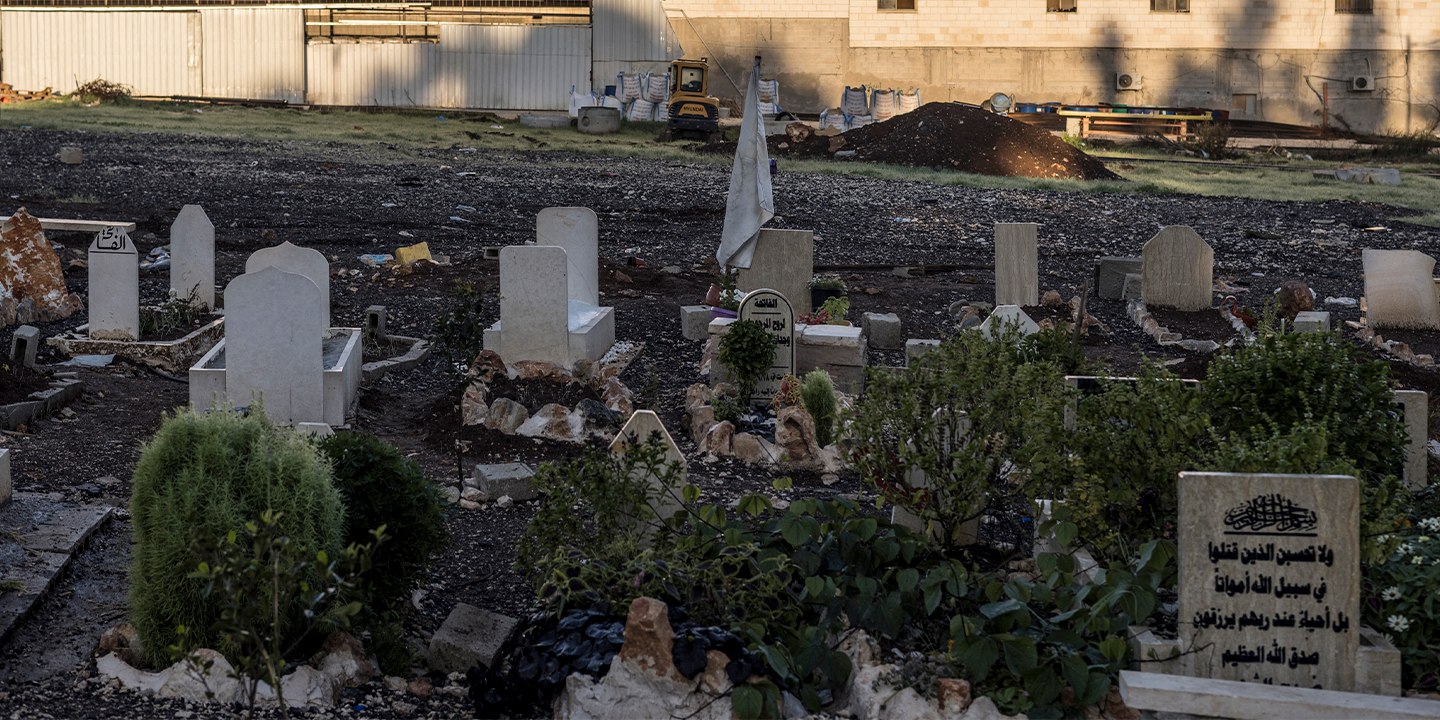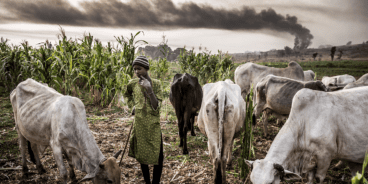

Atrocity Alert No. 378: Israel and the Occupied Palestinian Territory, Sudan and Prospects for the Protection of Children
Atrocity Alert is a weekly publication by the Global Centre for the Responsibility to Protect highlighting situations where populations are at risk of, or are enduring, mass atrocity crimes.
VIOLATIONS AND RISKS TO CIVILIANS IN OCCUPIED WEST BANK CONTINUE TO WORSEN
In early January, Israeli military raids in the Nur Shams refugee camp in Tulkarm city of the Occupied West Bank injured many Palestinians, including a child. During the raid Israeli forces restricted access to the Tulkarm hospital and detained dozens of Palestinians, while residential houses were severely damaged by detonations or demolition by bulldozers. The raids are characteristic of escalating violence in the Occupied West Bank since Hamas and other Palestinian armed groups perpetrated the horrifying attacks on Israel of 7 October. Since 7 October, at least 335 Palestinians have been killed by Israeli forces, while five Israelis, including four members of the Israeli forces, have been killed in Palestinian attacks in the Occupied West Bank. Additionally, the UN Office for the Coordination of Humanitarian Affairs (OCHA) has recorded 421 Israeli settler attacks against Palestinians since 7 October. Such attacks, including shootings and burnings of homes, have resulted in numerous casualties and extensive damage to property. The Office of the UN High Commissioner for Human Rights (OHCHR) has reported that settlers carrying out these attacks are at times acting with the acquiescence and collaboration of Israeli forces and authorities.
According to recent reporting by OHCHR, there has been a sharp increase in unnecessary and disproportionate force by Israel in the Occupied West Bank, including airstrikes, violent military tactics in law enforcement and incursions by armored personnel carriers and bulldozers sent to refugee camps which have resulted in unlawful killings and damage to civilian objects. Israeli security forces also continue to conduct daily mass arrests, with thousands of Palestinians arrested. OHCHR has reported numerous incidents of alleged torture and other ill-treatment against Palestinian detainees by Israeli forces.
This past year was the deadliest on record for both Palestinians and Israelis in the Occupied West Bank since OCHA started recording casualties in 2005, with at least 507 Palestinians and 36 Israelis killed in 2023. Prior to 7 October, there were already a record number of casualties in the Occupied West Bank, with regular violence by Israeli forces and settlers killing and injuring hundreds of Palestinians, as well as targeted attacks by armed Palestinians killing and injuring dozens of Israelis. In November UN High Commissioner for Human Rights Volker Türk said, “We are well beyond the level of early warning. I am ringing the loudest possible alarm bell about the occupied West Bank.”
Under international law, Israel has an obligation as the occupying power to ensure the safety and protection of Palestinians as the occupied population. Israel must cease any collective punishment of Palestinians in both the Occupied West Bank and Gaza, end arbitrary detention and ill-treatment of Palestinians, halt the use of military weapons and methods in law enforcement, lift any discriminatory movement restrictions and ensure accountability for settler violence.
CIVILIANS IN SUDAN CONTINUE TO FACE ATROCITY CRIMES AS VIOLENCE SPREADS
Violence and atrocities continue unabated in Sudan as the conflict between the Sudanese Armed Forces (SAF) and the Rapid Support Forces (RSF) enters its tenth month. Since the outbreak of the conflict on 15 April 2023, both sides have repeatedly launched indiscriminate attacks on and from densely populated areas using weapons with wide area effects, increasing the risk of harm to civilians. At least 33 civilians were killed in Khartoum on 11 January as result of aerial bombardments and artillery fire. Days earlier, on 8 January, the RSF attacked SAF-controlled areas in Omdurman and the El Sawra neighborhoods of the city with mortar shells. The SAF in turn has intensified its attacks against RSF targets using aerial bombardments and heavy artillery in the southern Omdurman neighborhoods of El Fitihab and El Salha.
While the SAF is reclaiming control over parts of Khartoum, the RSF continues to strengthen its presence and expand control over territories in Al Jazeera State and areas in the Kordofan states. During December fighting characterized by widespread and grave human rights violations and atrocity crimes, including sexual violence and the looting of humanitarian supplies, in and around the capital of Al Jazeera State, Wad Medani, prompted more than 500,000 people to flee. In West Kordofan, the risk of potential clashes and infighting has heightened amid RSF attacks on SAF targets. West Kordofan is home to the Misseriya community, the second-largest ethnic group in Sudan, and the RSF is predominantly composed of Misseriya men. Expanding RSF presence has led to heightened tensions and disagreements among local leaders, as some remain supportive of the RSF’s ambitions to consolidate control over Kordofan while others oppose the elimination of government forces, particularly from the border area with South Sudan, and fear that their communities will get caught in the crossfire.
Meanwhile, following the RSF’s takeover of several areas in Darfur during November, violence against civilians persisted amid RSF raids and SAF airstrikes throughout December. The RSF’s military advancement across Darfur increases the risk of atrocity crimes, particularly for civilians from non-Arab communities, given the ethnically charged nature of the current violence.
On 4 January UN Under-Secretary-General for Humanitarian Affairs Martin Griffiths said, “as the conflict spreads, human suffering is deepening, humanitarian access is shrinking, and hope is dwindling.” Since the conflict began, 12,000 people have been killed and more than 7.4 million currently displaced. The UN Office for the Coordination of Humanitarian Affairs estimates that 25 million Sudanese need humanitarian assistance as result of food insecurity, extensive damage to critical civilian infrastructure, including water and healthcare facilities, and the near total collapse of economic and financial services.
All parties to the conflict should immediately stop pursuing their military objectives and work toward a permanent cessation of hostilities and allow unhindered humanitarian access. In the absence of progress on these steps, all parties must ensure adherence to their obligations under international humanitarian and human rights law, including by ensuring the protection of civilians and ending the looting and destruction of civilian infrastructure.
NEW UN REPORT OUTLINES GRIM PROSPECTS FOR THE PROTECTION OF CHILDREN
In 2024, children across the globe are expected to need life-saving humanitarian aid in a world increasingly affected by conflict, poverty, polarization and the effects of the climate crisis, according to a new report by the UN Children’s Fund (UNICEF). The report, Prospects for Children 2024: Cooperation in a Fragmented World, looks ahead to the risks that children around the globe are likely to face this year, identifying eight trends that will endanger the rights, lives and wellbeing of children, particularly spotlighting escalating geopolitical competition and growing economic fragmentation.
UNICEF says that conflict was a “defining” feature of 2023, with the outlook for peace and security remaining bleak in protracted crises, such as in the Democratic Republic of the Congo and Syria, while the outbreak and intensification of conflicts, such as in Sudan and Israel and the Occupied Palestinian Territory, have had devastating impacts on children. Gaza has become the world’s most dangerous place to be a child, with the UN estimating that as many as 40 percent of Palestinians killed in Gaza are children. Violence between the Sudanese armed forces and paramilitary forces has driven more than 7.4 million people from their homes, at least half of whom are children, making it the largest child displacement crisis in the world.
According to the report, there is heightened risk of further conflict and continued instability in 2024, which will mean increased exposure to violence and war, as well as “grave violations” against children. The Executive Director of UNICEF, Catherine Russell, said, “Around the world, war continues to upend the lives of children… And wherever violence occurs – in places like Burkina Faso, Haiti, the State of Palestine, Sudan and Ukraine – children suffer first, and they suffer most.” UNICEF estimates that there are currently 460 million children living in, or fleeing from conflict zones, where many experience daily threats of violence, displacement and the disruption of their education and essential services. In a separate statement, Russell emphasized, “The suffering of these children is an indictment of a world that has failed to protect them from the dangers of war.”
New and protracted conflicts do not occur in a vacuum, but rather coincide with other devastating crises that significantly impact children, including climate emergencies, disease outbreaks, public health emergencies and economic hardship. With children facing an array of intensifying and interconnected crises, and with global humanitarian needs at near record levels, the international community must urgently increase emergency funding and expand humanitarian aid. States should strengthen monitoring and accountability mechanisms to better protect children in conflict. The lives and well-being of all children, no matter who or where they are, must be protected.
Related Content


Atrocity Alert No. 444: Nigeria, Haiti and South Sudan
